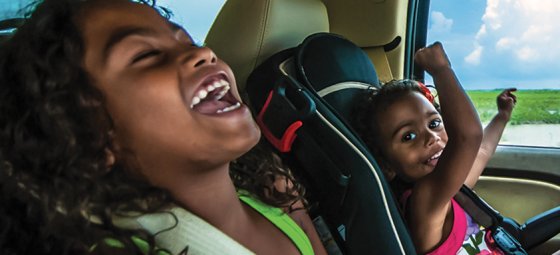
Older children who have outgrown their child restraint seats, but who are still too small for adult-sized seatbelts in vehicles, still need to be properly secured while travelling, although recent research suggests this isn’t happening. Findings from the Automobile Association’s (AA) Child Safety Seat Survey – conducted last year – also highlight that a quarter of motorists admit to not restraining children under twelve years of age at all while driving.
Having a child passenger – whether it is in the front passenger seat or back seats – restrained while driving is absolutely essential to ensure proper safety. Study after study has shown that children who aren’t properly restrained, and who are involved in crashes – even at slower speeds – have more chance of being seriously injured or, worse, killed, than those who are.
Many parents or guardians do not restrain children when they are too big for baby car seats, and too small for adult-sized seatbelts. It is important to note that while current legislation is designed around the age of children who need to use child restraints, a better approach is to match the child’s size and weight with the appropriate seats.
In this case drivers must look for booster seats, or other restraining devices which are easily available and which cater for older or bigger children, to keep them safely harnessed in the vehicle. Having a child sit in a car without being buckled up is betting with their lives.
There are five important rules when driving with driving with children:
- Set an example by always using your own seatbelt
- Choose the right car seat for your baby or young child
- Properly attach the child seat to the car
- Fasten your child in the child seat correctly
- Adjust the harnesses as the child grows and adapt the harness for summer and winter clothing as there may be a difference
To assist parents or guardians make the right decision about car seats, we have published the results of comprehensive consumer tests conducted by the General German Automobile Club (ADAC) and the Program for the Evaluation of Child Retention Systems (PESRI) for Latin America and the Caribbean, which uses many of the same car restraints which are available in South Africa. For the convenience and benefit of those buying car restraints, these results are available at https://www.aa.co.za/child-car-seat-safety-ratings.
These results provide information on many of the car seats available in South Africa and how they fared in testing and are a guideline to prospective buyers. The most important tip when buying a car seat, though, is to take your vehicle and child with you to the shop and to try different models before making a decision.
“It won’t happen to me” syndrome
There is an unfortunate perception among many drivers that because they consider themselves to be excellent drivers, their passengers don’t need to be restrained because “I will ‘never be in a crash”.
People overestimate their abilities which, in the end, doesn’t determine whether they are involved in a crash or not. Many good drivers are the victims of other people’s reckless road behaviour and precisely for this reason, every precaution must be taken to ensure your, and your passengers’ safety.
Current legislation requires children up to the age of three to be harnessed securely in an approved child restraint when travelling in a car. This does not include an adult holding onto a baby in the front seat of a car when the car is on the road.
A ten kilogram child who is involved in a crash at 60km/h will weigh 600kgs at the moment of impact. At this weight, no-one is going to prevent that child from slamming through the front windshield. People who have children sit on their laps while driving (in many instances who are themselves buckled up) are reckless and irresponsible and should immediately stop this dangerous practice.



